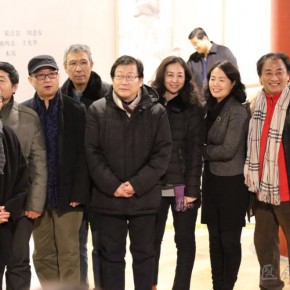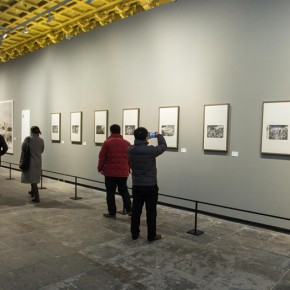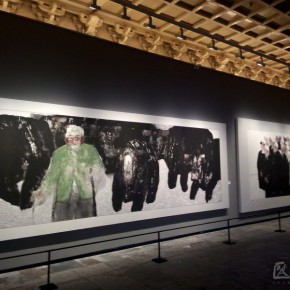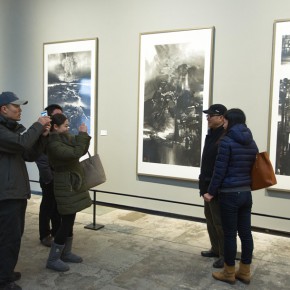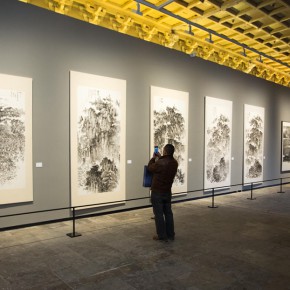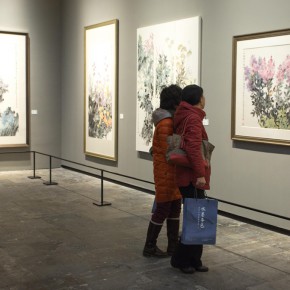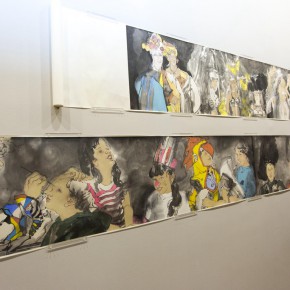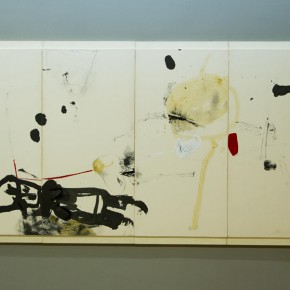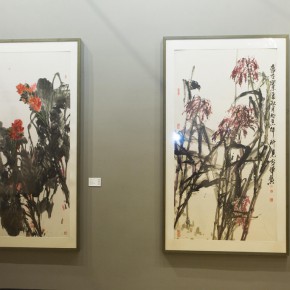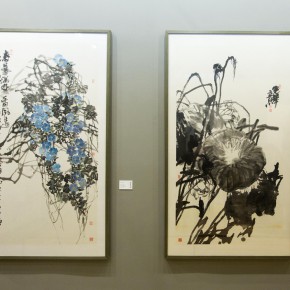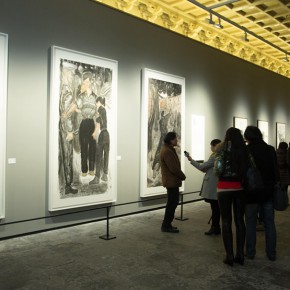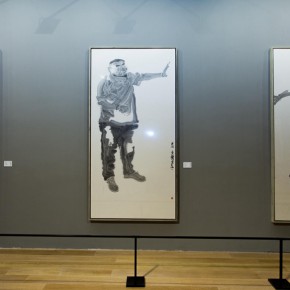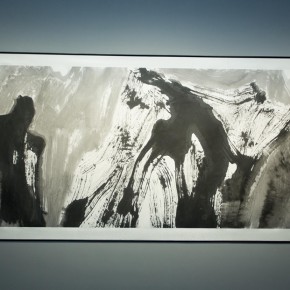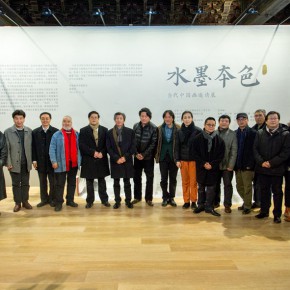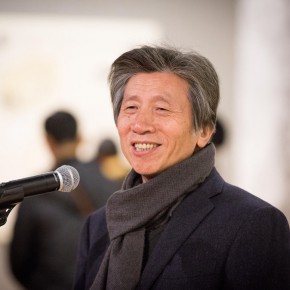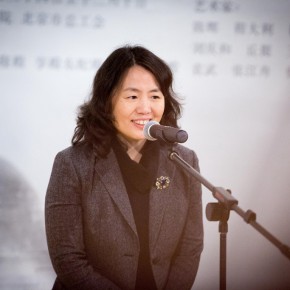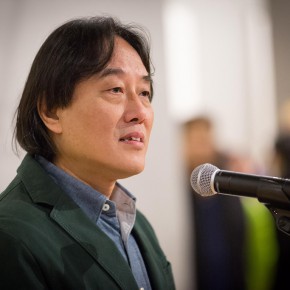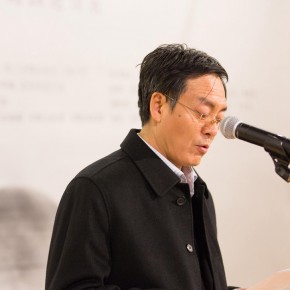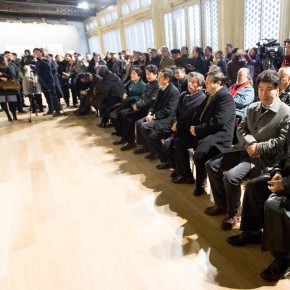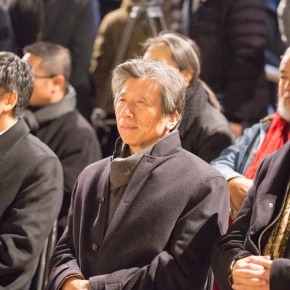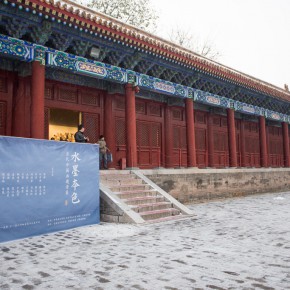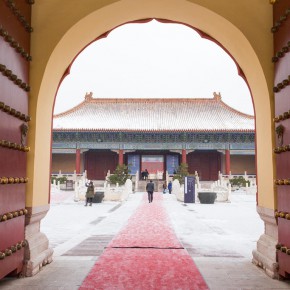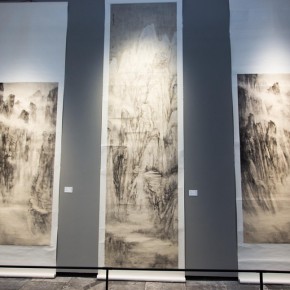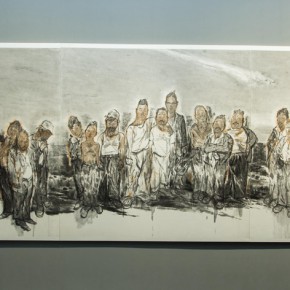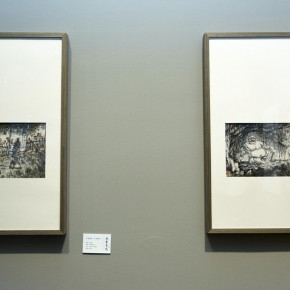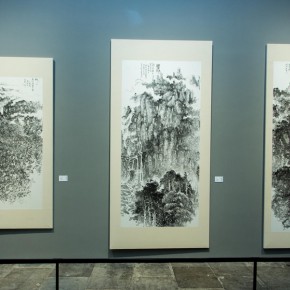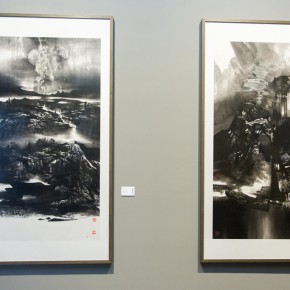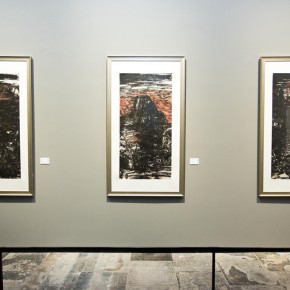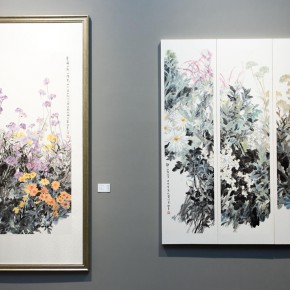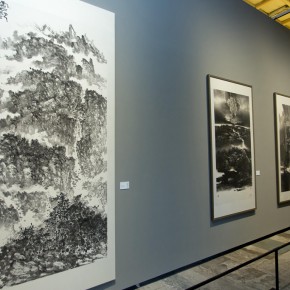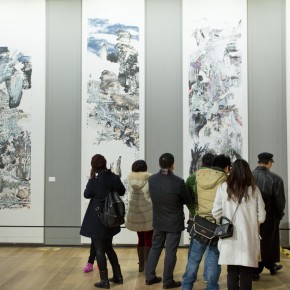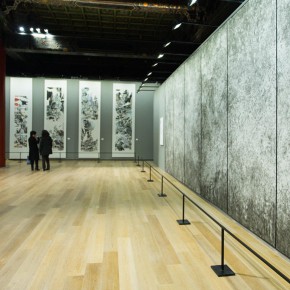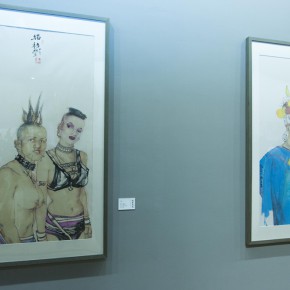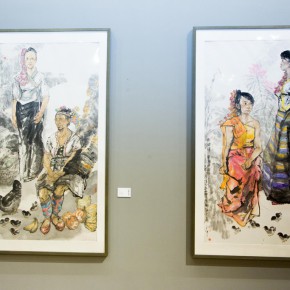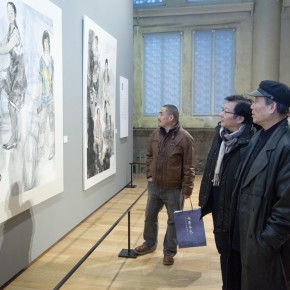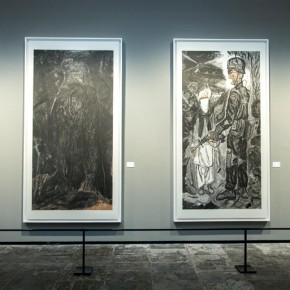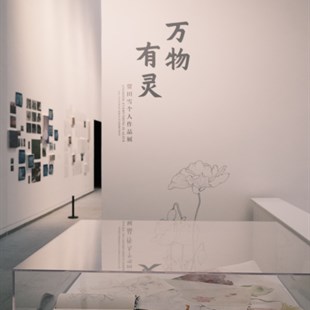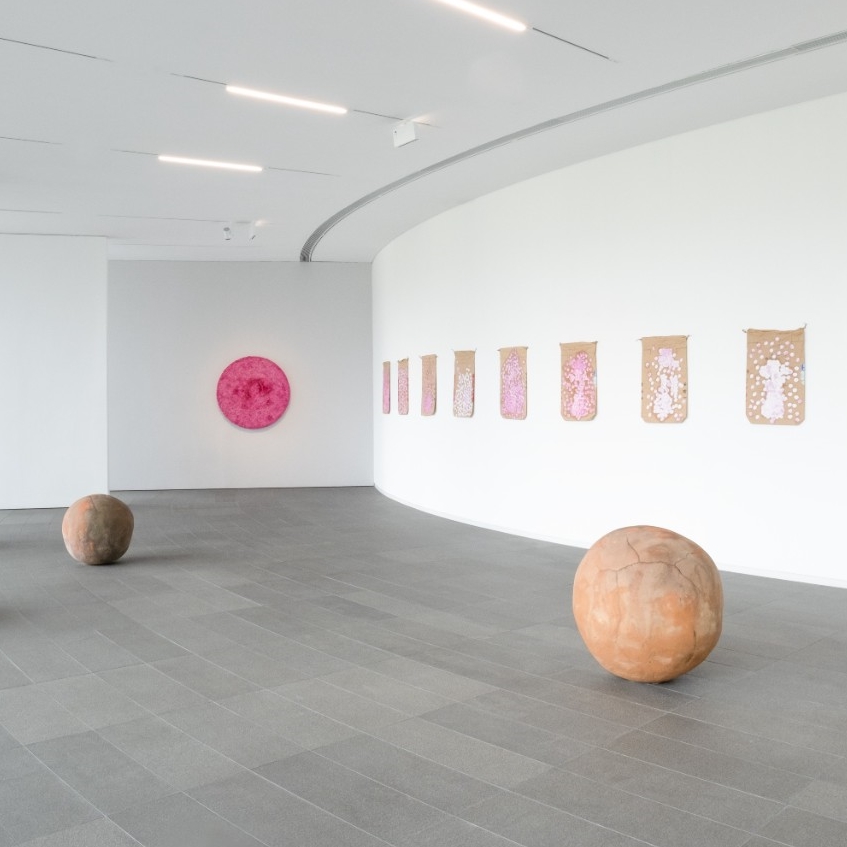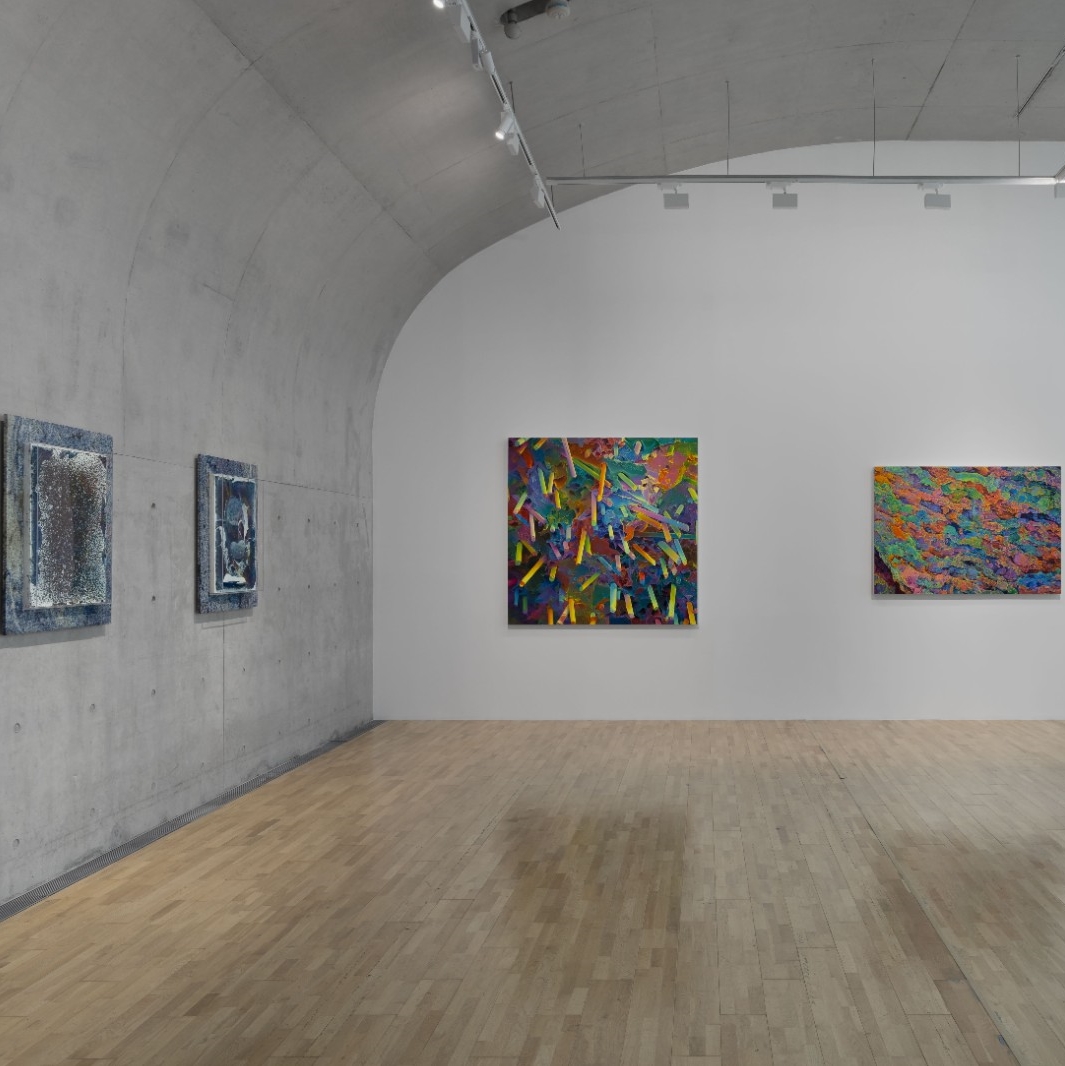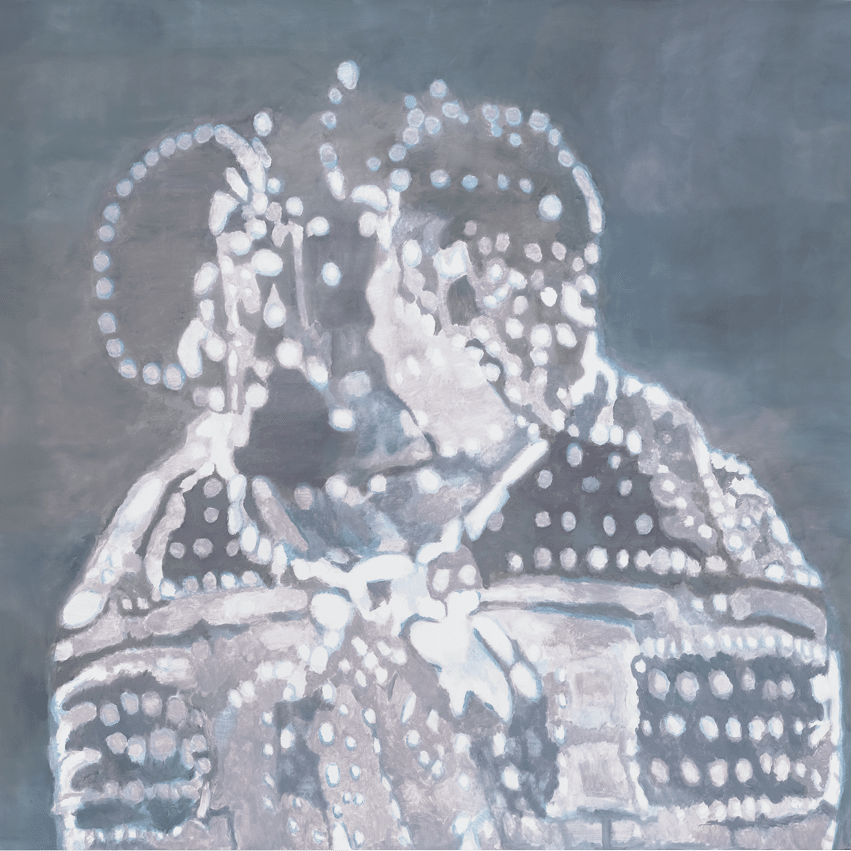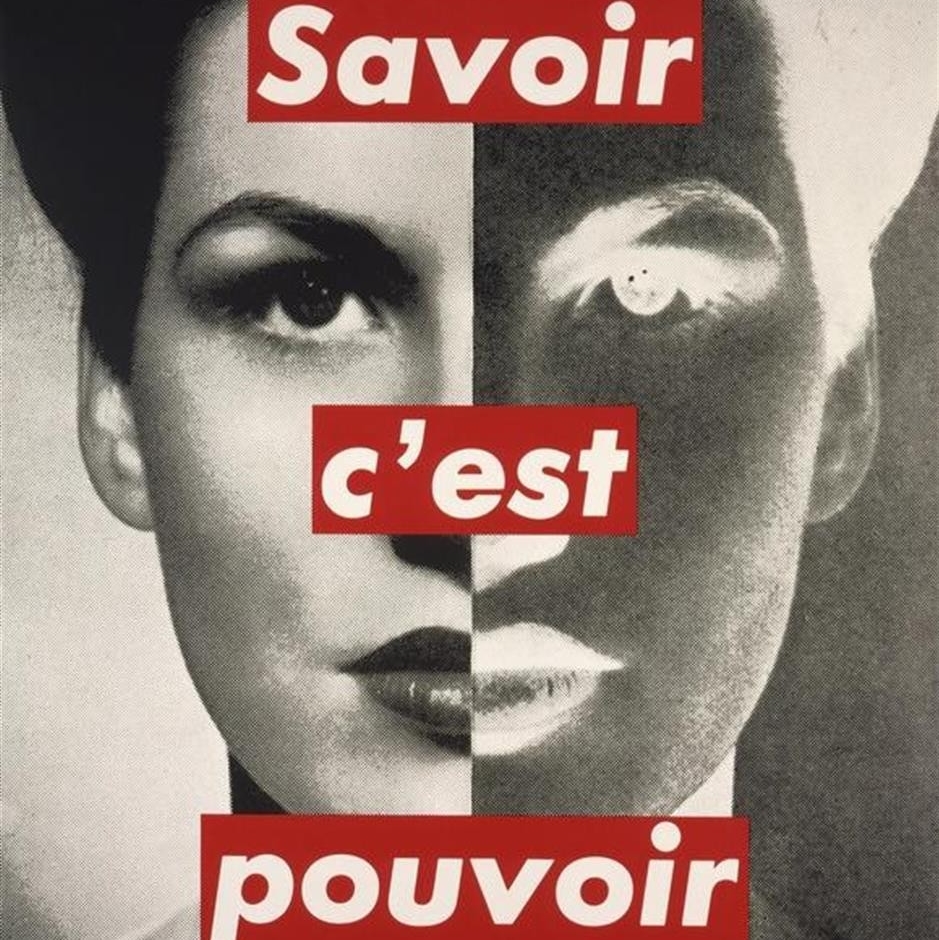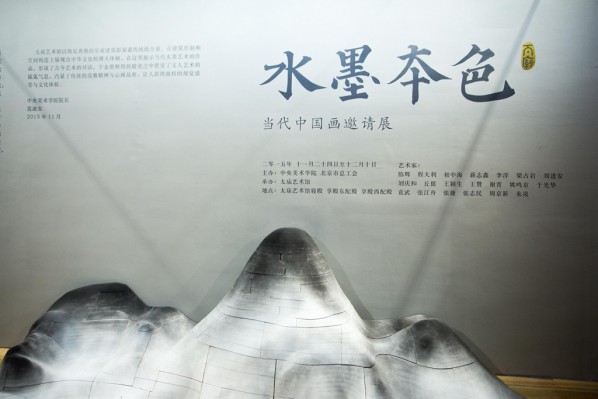
On the afternoon of November 24, 2015, organized by The Central Academy of Fine Arts, Beijing General Labor Union, undertaken by the Ancestral Temple Art Gallery, “True Color of Ink Painting: Invitational Exhibition of Contemporary Chinese Painting” opened at the Ancestral Temple Art Gallery. It was planned by the President of CAFA Fan Di’an, with Director of the Collaborative Innovation Office of CAFA Yue Jieqiong as the executive curator, to bring together the works by ink painters including Cheng Dali, Chen Hui, Chu Zhonghai, Jiang Zhixin, Liu Jin’an, Liu Qinghe, Liang Zhanyan, Li Yang, Qiu Ting, Wang Yingsheng, Wang Zan, Xie Qing, Yu Guanghua, Yao Mingjing, Yuan Wu, Zhang Jie, Zhang Jiangzhou, Zhang Zhimin, Zhou Jingxin, Zhu Nan, to showcase the art of ink’s calm thinking and multidimensional exploration in terms of sticking to tradition and the innovation of the era during the age of globalization.
With a profound academic force, excellently planned, the exhibition gathered many outstanding painters and received extensive attention from all walks of life. The Party member of Beijing General Labor Union, Vice President Pan Jianxin, Secretary-general of China Artists Association Xu Li, President of CAFA, the curator of the exhibition Fan Di’an, as well as representatives of the artists, including President of the China National Academy of Painting Zhang Jiangzhou, Vice President of the China Academy of Art Wang Zan, Cheng Dali, Chu Zhonghai, Jiang Zhixin, as well as Dean of the School of Plastic Arts, CAFA Ma Lu, Party Secretary Wang Yingsheng, Party Secretary of the School of Chinese Painting Yu Guanghua, Vice President Li Yang, Yao Mingjing, etc., attended the opening ceremony.
Vice President of Beijing General Labor Union Pan Jianxin addressed the opening ceremony and said that, the cooperation between Beijing General Labor Union, the Ancestral Temple Art Gallery and CAFA was like an alliance between giants, which strengthened the position of socialization, specialization, and the public welfare of the Ancestral Temple Art Gallery, through a series of art activities to promote the development of cultural and artistic enterprises, which had obtained good social effects. It launched a new exhibition of the well-known painters entitled the “True Color of Ink Painting” in cooperation with CAFA. The works of ink painting and the ancient Ancestral Temple reflected each other, thus contributing to the construction of a socialistic core value system. Vice President of the China Academy of Art Wang Zan addressed the opening ceremony on behalf of the participating artists, he reviewed the situation from when he first attended the “True Color of Ink Painting” exhibition in 2001, “True Color of Ink Painting” has lasted for 15 years, which reflects the domestic creative and academic circles that continuously pay attention to the ontology of the language of ink. It is held at the “Ancestral Temple” which is a Chinese traditional cultural palace, so it is the biggest motivation and encouragement to promote Chinese culture and discuss the nature of ink. As an artist, he will adhere to the traditional understanding of the essence of ink painting, in the diversified social and cultural development, to actively promote the diverse and multiple development of ink painting.
President of CAFA, the curator of the exhibition Fan Di’an said that, the exhibition was an academic gathering themed on “ink”. Since the first “True Color of Ink Painting” was held 15 years ago, the basic problem of Chinese ink painting had never changed during this period, but the cultural situation had had a profound change. In the current global cultural collision, how had ink painting with a profound tradition developed was the first problem faced by Chinese art. So it was necessary to launch “True Color of Ink Painting” again as this was a cultural development opportunity, to have an in-depth thought and communication opportunity through the exhibition, while it was an important academic construction, it also hoped that the exhibition was built to create a long-term academic brand at the same time.
Ink painting is a tradition and also a new academic subject in a new cultural context along with the development of the era. “True Color of Ink Painting” as an academic thesis, aimed at advocating the use of a contemporary cultural vision to further observe the tradition, the use of contemporary cultural feelings to further pursue the ontological value of the ink painting, so that contemporary ink painting becomes an open system, while constantly moving towards a new academic level. The participating artists both insist on the exploration of the language of ink painting, and also have an in-depth understanding of the ontological value of the language of ink painting, to have a more concentrated and clearer performance of the theme and subject matter at the same time, to showcase the strong thought and the serious academic attitude through the exhibition. For every individual, he has an in-depth cultivation of the categories of ink painting, such as the “core of literature”, “artistic conception”, “brushwork” and “management”, making ink language not only a general dimension, but it then has a more specific meaning, and it is a phenomenon that is worth studying to further explore the contemporary creation of ink painting.
On the opening day of the exhibition, it snowed in Beijing, so the Ancestral Temple with red walls and yellow tiles seemed to be more classical and magnificent, while the exhibition of ink painting added to the atmosphere of a literati’s dense breath, so that people got a special visual perception and cultural experience. The exhibition continues to December 10.
Text and photo by Zhang Wenzhi, translated by Chen Peihua and edited by Sue/CAFA ART INFO
About the exhibition
Title: True Color of Ink Painting: Invitational Exhibition of Contemporary Chinese Painting
Organizers: The Central Academy of Fine Arts, Beijing General Labor Union
Undertaker: Ancestral Temple Art Gallery
Venue: Sleeping Palace, the Eastern Side Hall and Western Side Hall of the Pleasure Palace in Ancestral Temple Art Gallery
Opening: November 24, 2015 15:00
Duration: November 24 – December 10, 2015
Participating artists:
Chen Hui, Cheng Dali, Chu Zhonghai, Jiang Zhixin, Li Yang, Liang Zhanyan, Liu Jin’an, Liu Qinghe, Qiu Ting, Wang Yingsheng, Wang Zan, Xie Qing, Yao Mingjing, Yu Guanghua, Yuan Wu, Zhang Jiangzhou, Zhang Jie, Zhang Zhimin, Zhou Jingxin, Zhu Nan
About the artists
Chen Hui
Born in Anhui province in 1959, Chen Hui graduated from the Central Academy of Arts and Crafts. He is a professor from the Academy of Arts & Design, Tsinghua University, doctoral supervisor, a member of the Academic Committee of the school, a member of the academic degrees evaluation committee, the standing deputy director of the Institute of Contemporary Art of the school. He has successively participated in the 10th, the 11th and the 12th National Art Exhibitions; The Louvre International Art Exhibition in 2012; The Chinese Civilization Historical Theme Art Creation Project Exhibition. The work “Chinese Culture” was awarded the Excellent Prize (top prize) by the 4th Beijing International Art Biennale. The works are collected by the National Art Museum of China, National Center for the Performing Arts, Beijing Fine Art Academy, etc.
“The ‘Chinese Culture’ series themed on the indoor scenes of the local dwellings in Wannan bring together the latest research and results of the experiment of ink and light language, focusing on the combination of the light and shadow effect of the western painting and the rhythm of ink, pursuit of the natural visual presentation of a real or imagined light sensation and artistic conception in the flowing of thick and thin ink.” – Chen Hui
Cheng Dali
Born in Jiangsu province in 1945, Cheng Dali is a Vice President of Chinese Painting Society, a researcher of China National Academy of Arts, a member of the Chinese Painting Art Committee of China Artists Association, a member of the faculty committee of the China National Academy of Painting, a librarian of the Central Research Institute of Culture and History. He was a former editor-in-chief of the People’s Fine Arts Publishing House, former President and the editor-in-chief of Jiangsu Fine Arts Publishing House, and the former editor-in-chief of “Jiangsu Pictorial”.
“The brush and ink bears an eternal and infinite esoteric world. ‘Stabilization is diverted from the mind, and the mind of children is the purest; the major principle is silent, while the music is infinite.’ First of all, the mind is settled down, the lofty realm comes from the contemplation, which comes from the mind, the literary mind and the carving of dragons is the spirit of the brush and ink.” - Cheng Dali
Chu Zhonghai
Born in Shandong province in 1956, Chu Zhonghai who is also named Baodao, Yidao, with a room named Hongtang, is currently the Director of the Yidao Beijing Art Gallery (Chu Zhonghai Art Gallery). He is a distinguished professor of the Renmin University of China, the tutor of Chu Zhonghai Chinese Landscape Painting and Calligraphy Studio of the Renmin University of China, Executive Vice President of Huang Binhong Art Research Association, a member of China Artists Association, member of Chinese Calligraphers Association, Vice President of Chinese Artists Association in Beijing.
“I write my landscape painting in dense black ink, the use of astringent, mature, raw, vigorous, forceful and unadorned temperament and interest of calligraphy, both giving consideration to and using cleverness and clumsiness, the virtual and reality, firmness and softness, density, fast and slow, pressing and lifting, directness and indirectness, square and round, to freely make out the mental imagery, rather than catering to the public, I am only in pursuit of the complete principles and rhythmic vitality, to present the spirit.” - Chu Zhonghai
Jiang Zhixin
Born in Pingliang, Gansu province in 1949, Jiang Zhixin, who is also named Manniu, Yuanheluzhu, Huangtuhun, Wanshi, graduated from the Department of Fine Arts, Northwest Normal University in 1974, studied in Beijing Fine Art Academy, where he learned from Wang Wenfang, Jia Youfu, Zhou Shaohua. He is a national first-class painter, a member of China Artists Association, a member of the French International Artists Association, Director of China Council of Asian Chinese Calligraphers Association, Director of the Council of Chinese Painting Institute.
“Learn from the nature, freely imagine and bluntly present the mind, to achieve the artistic realm of the unity of nature and man. The use of the true temperament and spirit, true perception and passion preforms the natural purity and magical by hook or by crook, splashing water and ink, to give full play to the characteristics of Chinese ink and the wonderful realm. I hope through my painting to convey such kind of realization to people.” - Jiang Zhixin
Li Yang
Born in Beijing in 1958, Li Yang was admitted to the Department of Chinese Painting, CAFA in 1981, and teaches in the school since he graduated in 1985. Currently he is a professor of CAFA, Vice President of the School of Chinese Painting, CAFA, member of Chinese Painting Art Committee of China Artists Association, a researcher of China National Academy of Painting, a researcher of the Academy of Chinese Painting affiliated to the China National Academy of Arts.
“The 6 exhibited works are different in the content of performance, but the techniques are integrating sketch into painting. The method of integrating sketch into painting makes the characters vivid, and each one has its characteristics, forming a rich and clever picture. This method has become the tradition of Chinese figure painting after the founding of new China, at the same time it is the academic and teaching tradition of CAFA.” - Li Yang
Liang Zhanyan
Born in Wuqiang, Hebei province in 1956, Liang Zhanyan learned Chinese figure painting from the painters Zhou Sicong, Lu Chen in 1979, and graduated from CAFA in 1990. He is a national first-class painter, a member of China Artists Association, and he was the former Vice Chairman of Hebei Provincial Artists Association, currently he is the Vice President of the Academy of Chinese Painting affiliated to China National Academy of Painting, a researcher.
“Recently I have drawn some paintings on this group of people, and hope to wholeheartedly find the valuable and plain sincerity as much as possible, influenced by the targeted painting consciousness, through the exploration of morphological structure of figures’ shaping, combination form of the language of brush and ink, formal language of painting, to reflect the temperature of humanistic concern that the figure painting should have.” - Liang Zhanyan
Liu Jin’an
Born in Hebei province in 1957, Liu Jin’an graduated from the Department of Fine Arts, Hebei Normal University. Currently he is the Dean, professor, doctoral supervisor of Capital Normal University, Director of China Artists Association, a member of the National Art Professional Degree Postgraduate Education Steering Committee, member of Chinese Painting Art Committee of China Artists Association
“My art of ink paintings are inclined to modern and contemporary. I believe that the art of ink has infinite vitalities and possibilities in the creation and exploration, the expressive force of ink can fully include the understanding of life and the expression of will by the painter. I feel that art is very simple, direct and sensible. Especially the art of ink, the material property demands one-off writing order, so that the situations such as arbitrarily, the unrestrained, agitation are presented by the painter.” - Liu Jin’an
Liu Qinghe
Born in Tianjin in 1961, Liu Qinghe graduated from CAFA in 1989. Currently he is Professor, Doctoral Supervisor, Deputy Dean of the School of Chinese Painting, CAFA.
“One has always been satisfied with the efforts in one day, which is originated from the joy in a moment, the true feeling is ego, and transient, but people think the transient enjoyment and stabbing pain is worthless for life, so that they don’t care it and also disdain sharing. Narration refers to narrative things to oneself in the past and in the future, in order to reflect the life at this very moment. Picking up and embracing the objects which were disdained ever, allowing oneself indulged in a familiar way, seemingly slowly stepping, it is a different state of mind and expectation compared with the previous one.” - Liu Qinghe
Qiu Ting
Born in Guangdong province in January 1971, Qiu Ting studied in the Department of Chinese Painting at the China Academy of Art, majored in Landscape Painting, gaining a bachelor degree, from September 1992 to July 1996, and studied for a master’s degree from September 1997 to July 2000; he then graduated from the Academy of Arts & Design, Tsinghua University after gaining a doctorate of fine arts from September 2000 to January 2004; he has taught at CAFA as an associate professor since 2004.
“Concept is currently the first, and the artistic creation becomes the evasive interpretation of ‘idea’, in the condition of the innovative origin of the theory of evolution under the utilitarianism of science and technology, I have always been exploring and persistently sticking to the use of ink to convey people’s inner feelings, to express the imageries beyond description.” - Qiu Ting
Wang Yingsheng
Born in Shenqiu, Henan province in 1963, Wang Yingsheng graduated from the Department of Fine Arts, Henan University in 1983 and taught in the department. He was admitted to the Department of Chinese Painting, CAFA, as a master’s candidate in 1995. He graduated in 1997, with a master’s degree, and then received a doctoral degree.
“The content and images of the exhibited works of ink painting are the continuation of previous themes, most of which were finished on the basis of the landscapes and figures sketched when I studied and traveled abroad. I use ink to record and apply heavy color to interpret the “true color of ink painting” in my understanding”! - Wang Yingsheng
Wang Zan
Born in Yangzhou, Jiangsu province in May 1959, Wang Zan is currently Vice President of the China Academy of Art, Doctoral Tutor, Professor, Deputy Director of the Academic Committee of China Academy of Art, Director of the Academic Degrees Committee, Director of China Artists Association, Deputy Director of Chinese Painting Society of China Artists Association, Vice Chairman of Zhejiang Provincial Artists Association, Proprieter of the Art Newspaper, Vice President of Zhejiang Provincial CPPCC Poem, Chinese Calligraphy and Painting Friends Society, one of the Zhejiang Provincial Young and Middle-aged Experts of Outstanding Contribution, enjoying the special allowances by the state council.
“I have always been thinking of the scene that shocks the mind in the creation, and the perfect technique of brush and ink is a distressing thing for painters, the success or failure of work is obviously not a simple subjective imagination, only when these works present the personal experience and development, the tough things and problems will be as apparent as accomplishments.” - Wang Zan
Xie Qing
Born in Guangdong in 1971, Xie Qing is an Associate Professor of the School of Chinese Painting, CAFA, Doctor, and a member of China Artists Association. In 1991, he graduated from the High School affiliated to CAFA, and graduated from the School of Chinese Painting, CAFA, with a bachelor’s degree in 1995, and with a master’s degree in 1997, teaching in the school since then, he received the doctorate of the School of Chinese Painting, CAFA in 2008.
“I feel that each mature system has the own logicality, involved in the internal and external causes of the development and changes, it must be cautious to walk on the road of the integration of China and the west, it is the real creation to go with your heart. I have been adhering to the use of the traditional materials such as raw rice paper and brush in the creation, and hope that the traditional Chinese pigments can be effectively used in the freehand brush work, properly combined with ink. It will be developed on the basis of the inheritance, and I consciously maintain the essence of Chinese painting.” - Xie Qing
Yao Mingjing
Yao Mingjing was born in Beijing in 1959, and the ancestral home is Wuxi, Jiangsu province. He graduated from the School of Fine Arts, Capital Normal University with a bachelor’s degree in 1982, majored in Chinese Painting, and then he taught in the Department of Fine Arts of the Beijing Institute of Education in September of the same year. Yao finished a further education in Lu Chen’s studio at the Department of Chinese Painting, CAFA in 1987, and finished an advanced study in the well-known Japanese artist Kayama Matazo’s Art of Ink Senior Workshop in August of the same year. He was transferred to the School of Chinese Painting, CAFA in 1990, since then he is a teacher of CAFA.
“Three Scenes and Three Fars”, no matter it narrates from the beginning, narrates from the end, or it is an interleaved narration, it can through the arrangement of staggered spaces, flitting of the combined screens, through interspersing, concealing the close-up variant shapes, as well as the staggered spatial ups and downs, to break the time and space, breaking the normal vision, in order to maximally return to nature of art.” - Yao Mingjing
Yu Guanghua
Born in Jinan, Shandong Province in 1959, Yu Guanghua is a professor of CAFA, Doctor, supervisor of postgraduate, a member of China Artists Association. Currently he is Party Secretary of the School of Chinese Painting, CAFA.
“Years of teaching and creation of Chinese painting helps me more honestly grasp the divergence between rationality and sensibility, and it even has developed a habit of thinking and transforming between rationality and sensibility by leaps and bounds. So my creation is the combination of a rational framework structure and the shaping of perceptual brush and ink on the whole.” - Yu Guanghua
Yuan Wu
Born in Jilin city of Jilin province in 1959, Yuan Wu graduated from the Department of Northeast Normal University in 1984, graduated from the Department of Chinese Painting, CAFA in 1995, with a master’s degree. Currently he is Executive Vice President of the Beijing Fine Art Academy, Director of China Artists Association, Deputy Director of Chinese Painting Art Committee, enjoying the special allowances by the state council.
“The difficulty of the art of painting doesn’t belong to the category of technique including shape, line, brush and ink, composition. The real difficulty is getting an artistic feeling at any time. A person is often interested in painting and studies painting because he has a sentiment of art. No matter what form of art, it starts from technique, repeatedly training and correcting.” - Yuan Wu
Zhang Jiangzhou
Born in Anhui province in 1961, Zhang Jiangzhou is Vice President of the China National Academy of Painting, the school committee and a researcher. He is a director of China Artists Association, member of Chinese Painting Art Committee of China Artists Association, Executive Director of the Chinese Painting Society, enjoying the special allowances by the state council.
“Chinese painting does not only depend on the content and images to convey aesthetic feelings, and painting language has a unique charm itself. In the process of creation, I pay attention to fully mobilizing the ontology language of painting. In the paintings themed on city, urban characters are only the medium, to inspire me in contemporary urban aesthetic and value judgment, and through the relative personalized language to express my awareness of contemporary culture.” - Zhang Jiangzhou
Zhang Jie
Born in Taizhou in Zhejiang province in 1963, Zhang Jie who is also named Banbai, Dunfu, Kuilu, has graduated from China Academy of Art, with a bachelor’s degree, master’s degree and doctorate, and received a doctorate of Fine Arts. Currently he is Professor of the College of Chinese Painting and Calligraphy Art of the China Academy of Art, a member of the academic committee, supervisor of postgraduate, Director of the Teaching and Research Studio of Landscape Painting, Dean of Zhejiang Provincial Academy of Modern Ink Painting, member of China Artists Association. He has published more than 40 personal albums and books.
Zhang Jie’s painting practice is based on the premise of the knowledge and understanding of tradition, rather than the use of the historical sequence linear to research tradition, he uses his own learning and cultivation to explore the common proposition which is full of theoretical significance in the tradition. His picturesque scene is an ideal home which is beyond the secular, embodying the harmonious combination of the modern way of life with a free will and the classical artistic atmosphere.
Zhang Zhimin
Born in Shandong province in 1956, Zhang Zhimin, who is also named Dashitou, graduated from Shandong University of Arts in 1983 and remained on the school staff after graduation at the same year. He is mainly engaged in the teaching, research, creation and art education of Chinese painting.
“It is necessary for me to find a new language diverted from ‘life’, which is reflected on two aspects: firstly ‘unfamiliar’, creating unfamiliar feelings in painting, through the unfamiliar screen to present familiar feelings is a reflection of skills; secondly ‘birth’, presenting the ‘life and growth in nature’ of the times, in order to make the painting has a livelihood, vitality and life.” - Zhang Zhimin
Zhou Jingxin
Born in Nanjing, Jiangsu province in 1959, Zhou Jingxin is Dean of Jiangsu Provincial Academy of Chinese Painting, Director of the art committee, Director of China Artists Association, member of Chinese Painting Art Committee, Chairman of Jiangsu Provincial Artists Association, Dean of the School of Fine Arts of the Nanjing University of the Arts, professor, doctoral supervisor, a distinguished researcher of the China National Academy of Painting, a distinguished researcher of artistic creation at the China National Academy of Arts, doctoral supervisor, a standing committee of Jiangsu provincial CPPCC, enjoying the special allowances by the state council.
“I have always loved ‘sketch’, in such a steady state, I can enjoy the hard experience from the digestion of ‘object’ to the shaping of ‘portrayal’; enjoying the pleasure of seeing the life, having ideas, and expressing objects by a perfect way; enjoying the infinite pleasure of breaking the rules and creating the “individual rule” under the constraint of “classical testimonies”; enjoying the transcendent realm realized by clearly writing based on the ideal of the shaping by brush and ink.” - Zhou Jingxin
Zhu Lan
Born in Beijing in 1962, Zhu Lan graduated from the Department of Fine Arts of the PLA Academy of Arts in 1983 with a bachelor’s degree, majored in Chinese painting and graduated from Kyoto City University of Arts in 1990 with a master’s degree, majored in Italian fresco. He is a professional painter, currently lives in Beijing and Canada.
“In the creation of abstract works, I work as a command, all the parts and notes should be ready, and I need to face the constant choice and the unknown, I care about that the works conveying feelings and ideas clearly restore the authenticity. Compared to richness, I prefer to simplicity, because it is simple, rather than I am good at purifying. The nearly 30 years of abstract seems to have naturally entered the blood, I hope to keep away from the inertia, always keeping fresh vision to see the world.” - Zhu Lan
Courtesy of the artists, translated by Chen Peihua and edited by Sue/CAFA ART INFO.


